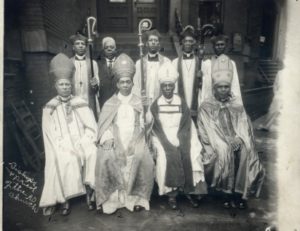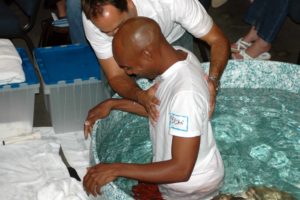About Us
Our Story

- Anglican History – Formed on March 28, 2013 as the Church of Emmanuel (USA), our founder Abraham David Parker secured for himself and the Church, apostolic succession through ordination to the Anglican episcopacy by the hands of three Bishops of the Worldwide Anglican Church (WAC) on June 30, 2019. Our spiritual lineage through the WAC, successor to the African Orthodox Church formed in 1921, grafted the Church of Emmanuel (USA) now legally known as the Free Anglican Church of Emmanuel USA (FACE-USA), into over 100 years of historically Black Anglican tradition. After serving a full term as the chief episcopate for the WAC Archdiocese of California, Bishop Parker retired from the WAC on October 18, 2024 as Archbishop Emeritus.
- While we reject both infant baptism as sufficient for Christian discipleship, and communion with the Archbishop of Canterbury as necessary for Anglican identity, our ecumenical communion retains the Evangelical doctrine, doxology, discipline, and dress of the Anglican tradition in accordance with the Baptist principle of Church Freedom.

- Baptist Heritage – Our founder received Believer’s Baptism as a small boy at a Missionary Baptist Church in Chicago, Illinois. He also received his Master of Arts in Pastoral Ministry from Grand Canyon University. Today, what is now a regionally accredited university and Association of Theological Schools-accredited seminary once began as a Southern Baptist institution of higher learning. Bishop Parker served as an Associate Minister at Saint John Missionary Baptist Church while on sabbatical in 2021. On March 17, 2022, Bishop Parker was called as Interim Senior Pastor of the First Southern Baptist Church of Arvin before retuning to Bakersfield where he continues to preach the Word of God with clarity and conviction. As of November 8, 2022, Saint Martin’s Chapel of Bakersfield, the cathedral church of the Full Gospel Baptist Alliance, is officially in cooperation with the California Southern Baptist Convention.

- Charismatic Heart – Originating in Phoenix, Arizona as a renewal born of the Holy Spirit, the Full Gospel Baptist Alliance continues answering God’s call in Christ Jesus to the Pentecostal/Charismatic family of churches to return to our Wesleyan roots. True to John Wesley’s ecumenical legacy, we Anglo-Baptists value theological diversity and ecclesiastical unity while holding to the Trinitarian faith of the early church. As a confessional body of believers, Anglo-Baptists open out hearts to the gifts of the Holy Spirit. Anglo-Baptist clergy are expected to meet rigorous standards of pastoral ethics and are encouraged to become active members of the scholarly community.
Our Mission
To make, mark, and mature disciples of Jesus Christ (Matthew 28:19-20).
Our Vision
To mobilize a movement of churches animated by the Great Commission,
the Great Commandment, and the Great Tradition of our Christian faith (Jude 1:3).
Our Evangelical Statement of Faith*
- We believe the Bible to be the inspired, only infallible, and authoritative Word of God.
- We believe that there is one God, eternally existent in three persons: Father, Son and Holy Spirit.
- We believe in the deity of our Lord Jesus Christ, in His virgin birth, in His sinless life, in His miracles, in His vicarious and atoning death through His shed blood, in His bodily resurrection, in His ascension to the right hand of the Father, and in His personal return in power and glory.
- We believe that for the salvation of lost and sinful people, regeneration by the Holy Spirit is absolutely essential.
- We believe in the present ministry of the Holy Spirit by whose indwelling the Christian is enabled to live a godly life.
- We believe in the resurrection of both the saved and the lost; they that are saved unto the resurrection of life and they that are lost unto the resurrection of damnation.
- We believe in the spiritual unity of believers in our Lord Jesus Christ.
*As adopted by the National Association of Evangelicals.
Our Baptist Distinctives
The Full Gospel Baptist Alliance affirms these Four Fragile Freedoms:
Bible Freedom
Bible Freedom is the historic Baptist affirmation or belief that the Bible, under the Lordship of Christ, must be central in the life of the individual and the church. Christians, with the best and most scholarly tools of inquiry, are both free and obligated to study and obey the Scripture.
- We the people called Anglo-Baptists affirm that the best and most scholarly tools of inquiry include, at minimum, the witness and writings of the wider church from every age, past and present.
- We the people called Anglo-Baptists also affirm that biblical interpretation, under the Lordship of Christ, calls us to define marriage as Christ did in Matthew 19:5 saying, “For this reason a man will leave his father and mother and be united to his wife, and the two will become one flesh,” in quotation of Genesis 2:24. The collective witness of both Old and New Testaments, especially the Epistles, are united for our intellectual understanding and volitional obedience.
- We the people called Anglo-Baptists reject the contemporary abuse of Bible Freedom in redefining marriage as an affront to historic Baptist doctrine. As Anglo-Baptists, we commit to labor alongside all Baptists and other Christians under the Lordship of Christ and the collective witness of the Bible.
Soul Freedom
Soul Freedom, which is also called the priesthood of all believers, affirms the freedom and responsibility of every person to relate to God without the imposition of creed, or control by clergy or the government.
- We the people called Anglo-Baptists affirm that sinners are saved by grace alone, through faith alone, in Christ alone, according to the Scriptures alone, and to the glory of God alone. Therefore, although personal confession to a clergy person or lay confessor is encouraged if an individual Baptist so desires, it is never required for one’s personal relationship with God.
- We the people called Anglo-Baptists affirm that while individual recitation of the creeds is not necessary for a personal relationship with God, congregational recitation of the creeds is in the convictional genes of the historic church, of which the Baptist tradition stands under. Therefore we not only affirm but also strongly encourage congregational recitation of the creeds as an integral part of Baptist worship.
- We the people called Anglo-Baptists affirm biblical leadership in the church has no right to control the individual Baptist, any more than the government has a right to control the individual Baptist. Unlike the monarchical bishops of medieval and modern times, our bishops are but trusted servants akin to the traditional Baptist state or national presidents of the past and present.
- We the people called Anglo-Baptists reject the giving of tithes and offerings to the church as a substitute for a personal relationship with God or as an attempt to secure God’s blessings, also called the prosperity gospel.
Church Freedom
Church Freedom, which is also called the autonomy of the local church, is the historic Baptist belief that local churches are free, under the Lordship of Jesus, to determine their membership and leadership, to order their worship and work, to ordain those men they perceive to be gifted for ministry, and to participate in the larger Body of Christ (e.g., other churches and denominations).
- We the people called Anglo-Baptists affirm the freedom and responsibility of our local churches to determine their own leadership, in covenant with the Full Gospel Baptist Alliance. Membership and other local church concerns are decided by consensus and one of a bishop’s primary tasks is to assist local churches discern the mind of Christ through using such consensus, not the use of coercion.
- We the people called Anglo-Baptists affirm the episcopacy as an added benefit to the congregational governance of our churches and a key instrument for our Christian unity with other churches and denominations requiring apostolic succession of all Eucharistic ministers.
- We the people called Anglo-Baptists affirm that each of its local pastors together with their respective congregations may freely affiliate or disaffiliate with like-minded churches or conventions of churches as befitting to their individual situation. All legal and fiduciary rights reserved, likewise the Full Gospel Baptist Alliance may freely disaffiliate with a previously affiliated congregation if it is determined that a congregation’s affiliations, doctrines, or practices deviate from the ethos of the Full Gospel Baptist Alliance.
- We the people called Anglo-Baptists reject all attempts to qualify or disqualify the apostolicity or catholicity of any church based solely on its form of governance.
- We the people called Anglo-Baptists reject the contemporary abuse of Church Freedom to engender strife and division around issues of human sexuality, ecclesiastical polity, or political preference.
Religious Freedom
Religious Freedom is the historic Baptist affirmation of freedom OF religion, freedom FOR religion, and freedom FROM religion. Churches and individuals should be free to worship in whatever manner they choose and with whomever they choose. All people, no matter their religious background, should be free from any coercion to worship and free from the intervention of the state in matters of religion.
- We the people called Anglo-Baptists affirm religious freedom primarily through the Baptist practice of believer’s baptism. This means we do not baptize infants or persons otherwise ill-equipped to make an informed decision to follow Christ in baptism.
- We the people called Anglo-Baptists affirm the religious freedom of individuals of all faiths or no faith at all. This means that to protect our own freedom of religion, we must protect everyone else’s also.
- We the people called Anglo-Baptists reject both historic and contemporary attempts to create a state church, even as we honor the apostolicity and catholicity of the historic churches of Ethiopia, Rome, England, and other state churches throughout the ages.